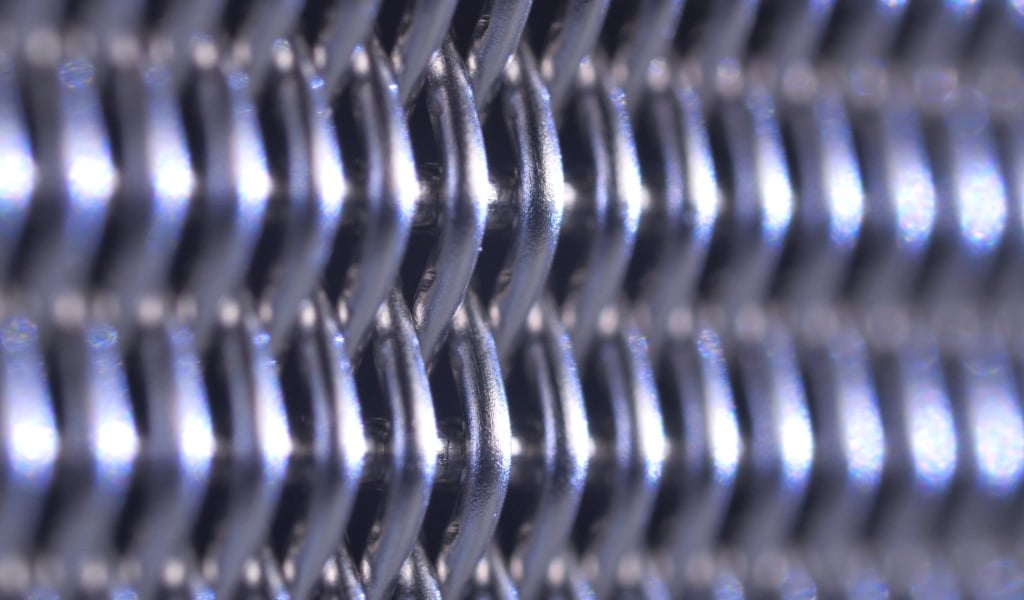Key Practices to Maintain Wire Mesh Used in Hydrogen Production
Maintaining efficiency and reliability in hydrogen production requires every component of the system to perform at its best. Wire mesh filtration plays a critical role in protecting catalysts, valves, and sensors from particulate contamination, yet it is often overlooked when it comes to routine maintenance.
Neglecting this essential element can lead to performance losses, unplanned downtime, and costly repairs.
Wire mesh used in hydrogen applications faces unique stresses such as high pressures, corrosive environments, and particulate buildup. Without proper care, these factors accelerate wear, reducing both the lifespan of the mesh and the overall stability of the production lines.
Establishing a proactive maintenance strategy ensures consistent purity levels and protects downstream equipment from avoidable damage.
At W.S. Tyler, our mission is to make the world cleaner and safer through precision-engineered filtration and woven wire mesh solutions. For more than 150 years, we’ve helped engineers and operators develop systems that improve reliability and optimize performance, even in the most demanding industrial environments.
In this article, we’ll explore why wire mesh maintenance matters, the most common challenges operators face, and preventative strategies that can extend service life. By applying these practices, you can reduce downtime, safeguard your equipment, and ensure reliable hydrogen production for the long term.
Why Wire Mesh Maintenance Matters
Wire mesh is one of the most critical components in hydrogen production lines, acting as a frontline barrier against contaminants that can compromise purity and system performance. Even the smallest amount of debris or particulate matter can damage catalysts, cause valve malfunctions, or reduce the efficiency of sensitive sensors.
Consistent mesh performance ensures the integrity of the production process and supports the delivery of high-purity hydrogen.
When maintenance is overlooked, mesh can become clogged, corroded, or structurally weakened. This not only reduces its filtering capability but also puts added stress on other system components. Over time, neglected wire mesh can lead to costly part replacement and reduced output efficiency, both of which impact profitability and reliability.
Need another reason why woven wire mesh is the best for hydrogen production? Discover more in our article below:
Proper wire mesh care extends beyond simply preventing breakdowns. It creates predictable operating conditions, allowing hydrogen producers to maintain steady flow rates and pressure levels. This consistency is vital for scaling operations, meeting customer demands, and ensuring compliance with quality and safety standards.
By prioritizing regular inspections, cleaning schedules, and timely replacement of wire mesh, operators can protect their investment and maintain system efficiency. In short, proactive maintenance is not just about preserving the mesh itself, but about safeguarding the entire hydrogen production process from unnecessary risk.
Common Challenges That Affect Wire Mesh Performance
Wire mesh in hydrogen production lines is constantly exposed to demanding conditions that can compromise its effectiveness over time. High operating pressures, fluctuating temperatures, and exposure to reactive gases place significant stress on mesh materials.
Without proper attention, these conditions can accelerate wear and reduce the mesh’s ability to filter contaminants effectively.
One of the most common issues is clogging caused by fine particles or residue buildup. As pores become blocked, flow resistance increases, which can lead to pressure drops and reduced system efficiency. In extreme cases, excessive clogging forces the system to work harder, potentially causing premature equipment failure.
Corrosion is another challenge that directly impacts mesh longevity. Even stainless steel or specialized alloys can degrade when exposed to moisture, trace chemicals, or aggressive hydrogen environments. Over time, corrosion weakens the structure of the mesh, creating pathways for contaminants to bypass filtration.
Mechanical damage also plays a role in mesh deterioration. Vibration, improper handling during maintenance, or stress from a system cycling can cause deformation or tearing. Once the mesh is compromised, it loses its precision filtering ability and increases the risk of contaminants reaching sensitive downstream components.
Preventative Maintenance Strategies for Longer Service Life
Extending the service life of wire mesh in hydrogen production begins with a structured preventative maintenance program. Rather than waiting for visible damage or performance issues, proactive care ensures that the mesh remains reliable under demanding operating conditions.
A consistent maintenance schedule helps to reduce downtime and protects critical system components.
Regular cleaning is one of the simplest yet most effective strategies. Depending on the application, cleaning may involve backflushing with gas, ultrasonic cleaning, or chemical rinsing to remove accumulated particles. This process helps to restore flow efficiency and prevents clogging from progressing to the point of system strain.
Inspection is another key element of preventive maintenance. Routine visual checks, combined with more advanced techniques like microscopy or flow testing, help detect early signs of corrosion, wear, or deformation. Identifying issues at an early stage allows for corrective action before the mesh becomes compromised.
Finally, keeping detailed maintenance records supports long-term reliability. Tracking cleaning intervals, inspection results, and replacement history provides valuable insights into mesh performance trends. This information can help to guide future maintenance planning, helping operators balance cost efficiency with operational safety.
Building Reliability Through Proper Wire Mesh Care
Maintaining wire mesh in hydrogen production lines is not just about extending the lifespan of a single component, it’s about protecting the integrity of the entire system. Proactive care ensures that filters continue to operate as intended, safeguarding catalysts, valves, and other sensitive equipment from harmful contaminants.
By prioritizing routine cleaning, inspections, and documentation, operators can minimize the risk of unexpected failures. Preventive strategies reduce downtime, improve efficiency, and support consistent hydrogen purity standards, which are critical for both safety and productivity.
At W.S. Tyler, we understand the role wire mesh plays in high-demand environments like hydrogen production. With over 150 years of experience, our mission is to provide reliable woven wire mesh and filtration solutions that help engineers to maintain cleaner, safer, and more efficient systems.
Want to discover more about the best practices to optimize your hydrogen filtration? Read more in our article below:
About Dylan Polz
Dylan is a Content Writer with 2 years of experience in marketing and SEO. Passionate about learning and strengthening his writing skills, he is currently expanding his expertise in particle analysis and woven wire mesh technologies. With a strong belief in the power of information to drive positive change, his goal is to develop content that supports cleaner, safer solutions across all industries.



